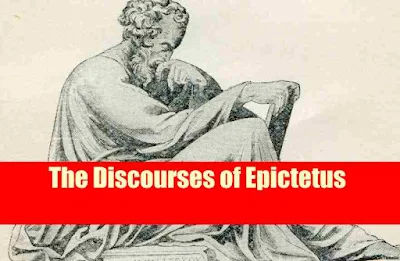The Discourses of Epictetus
From the introduction:
Epictetus is not his name but is a Greek word that denotes his servile condition. In his youth, he became the property of Epaphroditus, a freedman of Nero's, who permitted him to attend the lectures of Musonius Rufus, one of the most celebrated teachers in Rome. Having acquired freedom, he began to give lessons; but he was soon sent into exile, together with the other philosophers, by Emperor Domitian.
Settling at Nicopolis, in Epirus (modern Albania), he opened a school and continued to teach the doctrines of stoicism to the time of his death, at the age, it is supposed, of nearly a hundred years. He was feeble in body, lame, poor, and unmarried, living alone until he took an old woman into his house to care for an orphan whom he had adopted.
He wrote nothing but talked with his pupils in a familiar way of whatever concerns the conduct of life. Arrian, his favourite disciple, took notes of his conversations, not with a view to publication, but for his own use. When, however, without his knowledge, they had fallen into the hands of several, he edited them himself.
Thus we owe to an accident the existence of these " Discourses," which form one of the world's vital books. The " Manual " is a collection of aphorisms taken substantially from the larger work. Epictetus was not the founder of a new philosophy. Zeno, the originator of the Stoic system, was his master, and Zeno himself derived his fundamental principles from Antisthenes, the author of the cynic school and the friend of Socrates.
The Greeks are the creators of philosophy, and their earliest attempt at systematic thought was an effort to understand Nature. But they soon learned that it was necessary to begin from within, since to know3nything man must first know himself.
Thus the problem of the conduct of life forced itself upon them. This is the constant preoccupation of Socrates, who was born five hundred years before Epictetus. He taught that the good is" to be sought not in outward things, nor in the indulgence of appetite, but in virtue, which for him, however, is an intellectual rather than a moral habit. His calm and rational temper led him to the belief that man always acts in accordance with his knowledge, and does what insight shows him to be useful to himself. He who does evil does it from a mistake of judgment.
Sin is an error. Virtue, then, being chiefly knowledge, may be taught, and to teach it is the philosopher's life work. But Socrates moved in a circle from which there was no escape. To know the user is a virtue. But what is useful?
That which makes for virtue. Antisthenes does not attempt to determine the meaning of the good. He simply declares that virtue is the only good, and, in his view, virtue is the intelligent conduct of life. Right life is the essential good; virtue is its own reward, and one need not look to its results. It is, in the midst of whatever vicissitudes, a sure possession.
The virtuous man is independent of events and stands secure against fate and fortune. The world is full of things he does not need; he seeks not wealth, fame, nor hon- our, nor pleasure. Zeno, the Stoic, was born in Cyprus about 340 b. c is the heir of the Cynics.
The sage, as he conceives the truly wise and virtuous man, is first of all independent of the world, since only on this condition can he be free and find happiness in himself alone; and as what is external is but little subject to human will, he must overcome the world" within himself by gaining the mastery over the feelings and desires which it excites.
To be self-contained and self-sufficient, to remain unmoved in the presence of good or of evil fortune, imperturbable though the universe is shattered, is the goal he must strive to reach. If he can not defend himself against the excitations of feeling, he will at least refuse his assent, and thereby prevent them from becoming passions. His ideal is apathy, an absence of emotion.
The course of things may bring him pleasure and pain, but since he holds that the one is not good, the other not evil, he retains his equanimity. Virtue is his sole good, and the only evil is to^permit passion to conquer reason. This withdrawal of the individual within himself, however, it may be modified and supplemented, is an essential element in the Stoic's conception of life. \
The reason, from his point of view, is not only man's nature, but that of the universe, while the impulses of the senses are irrational. The soul, as part of the World-Reason, must therefore exclude from itself all excitation of feeling, ~"
To live in harmony with Nature is to rise into a sphere where the senses cease to trouble; it is to live in communion with the cosmic power, from which all things proceed, in cheerful obedience to the eternal destiny, which, being the will of God, is the divine law. The wise man accepts this life as his first and highest duty. It is the task which Reason imposes upon him. The Stoics, however, holding that man is by nature social, require that he lead a social life. The social ideal of the sage is that of a universal ethical community, and he is indifferent to forms of government and to actually existing states.
the book details :Author: Epictetus Translator: George Long
Publication date 1904
Company: New York: Appleton
the book details :

